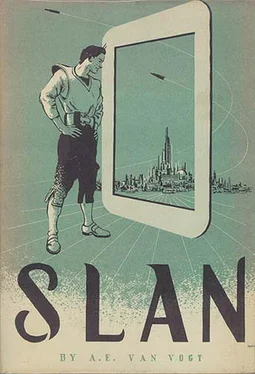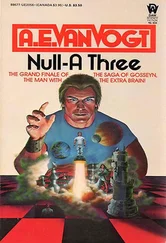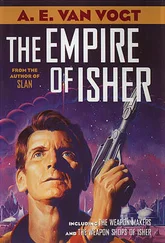"Since when has chemical reaction of the skin been a usual part of the examination?" The men did not apologize for their little trap, nor did their thoughts show any disappointment at failure. And Cross felt no thrill at this first small victory. For no matter what happened at this early stage, he could not possibly stand a thorough examination. He must use to the limit the preparations he had made these last several weeks when he had analyzed the information from Miller's and Corliss' minds.
The youngest man said, "Bring him into the laboratory and well get the physical part of this examination over. Take his gun, Prentice."
Cross handed over the weapon without a word.
They waited then, the oldest man, Ingraham, smiling expectantly, Bradshaw, the youngest, staring at him with unwinking gray eyes. Prentice alone looked indifferent as he pocketed Cross' gun. But it was the silence, not their actions, that caught Cross' mind. There was not a physical sound, nowhere even a whisper of conversation. The whole community of the hangar was like a graveyard, and for die moment it seemed impossible that beyond those walls a city hummed with activity in preparation for war.
He actuated the combination, and watched his cradle and ship slide off soundlessly, first horizontally, then up toward the remote ceiling. There was abruptly the faintest squealing of metal, and then it settled into position. And silence grew again over the brief protrusion of sound.
Smiling inwardly at the way they were watching him for the slightest error of procedure, Cross led the way to the. exit. It opened onto a shining corridor, the smooth walls of which were spaced at intervals with closed doors. When they were within sight of the entrance to the laboratory, Cross said:
"I suppose you called the hospital in time, telling them I would be delayed."
Ingraham stopped short, and the others followed suit They stared at him. Ingraham said, "Good heavens, is your wife being revived this morning?"
Unsmiling, Cross nodded. "The doctors were to have her on the verge of consciousness twenty minutes after I was due to land. At that time they will have been working for approximately an hour. Your examination and that of the military commission will obviously have to be postponed."
There was no disagreement Ingraham said, "The military will escort you, no doubt."
It was Bradshaw who spoke briefly into his wrist radio. The tiny, yet clear, answer reached to Cross.
"Under ordinary circumstances, the military patrol would escort him to the hospital. But it happens that we are confronted by the most dangerous individual the world has ever known. Cross is only twenty-three, but it is a proven fact that danger and adversity mature men and slans at an early age. We can assume, then, that we are dealing with a full-grown true slan, possessed of weapons and powers of unknown potentialities.
"If Corliss should actually be Cross, then the coincidence of Mrs. Corliss' return to consciousness at this important hour betokens preparation for all possible contingencies, particularly of suspicion at the moment of landing. He has already suffered a setback in that there is going to be an examination.
"Nevertheless, the very fact that postponement has been necessitated for the first time in our examination of men resembling Cross requires that experts trained in preliminary examination be with him every second of the time. You will, therefore, carry on until further orders. A surface car is waiting at the head of elevator Number I."
As they emerged into the street, Bradshaw said, "If he is not Corliss, then he will be absolutely useless at the hospital and Mrs. Corliss' mind will possibly be permanently injured."
Ingraham shook his head. "You're mistaken. True slans can read minds. He'll be able to do as good a job of sensing errors in the surgical room as Corliss with the aid of the Porgrave receivers."
Cross caught the grim smile on Bradshaws face as the slan said softly, "Your voice trailed off there, Ingraham. Did it suddenly occur to you that the presence of the Porgraves will prevent Cross from using his mind, except in the most limited way?" "Another thing" – it was Prentice who spoke – "the reason for Corliss' going to the hospital at all is that he will recognize when something is wrong because of the natural affinity between a husband and wife. But that also means that Mrs. Corliss will recognize instantly whether or not he is her husband."
Ingraham was smiling grimly. "We have, then, the final conclusion: If Corliss is Cross the revival of Mrs. Corliss in his presence may have tragic results for her. Those very results will go far to prove his identity, even if all other tests we make turn out negatively."
Cross said nothing. He had made a thorough examination of the problem presented by the Porgrave receivers. They constituted a danger, but they were only machines. His control over his mind should reduce that menace.
Recognition by Mrs. Corliss was another matter. Affinity between a sensitive husband and his sensitive wife was easily understandable, and it was unthinkable that he should contribute to the destruction of this slan woman's mind. Somehow he must save her sanity, but save himself, also.
The car sped smoothly along a boulevard that glowed with flowers. The road was dark, glassy in appearance, and not straight. It wound in and out among the tall, spreading trees that half hid the buildings that lined the far sides of the shaded walks to the left and right. The buildings were low-built structures, and their beauty, the flowing artistry of their design, surprised him. He had captured something of the picture they made from the minds of Miller and Corliss, but this triumph of architectural genius was beyond his anticipation. A fortress was not expected to be beautiful; gun turrets ordinarily were built for usefulness rather than to serve as poems of architecture.
As it was, they served their purpose admirably. They looked like actual buildings, part of an actual city, instead of being-merely a thick armored screen for the true city below. Once again the vastness of the defense forces showed with what respect the true slans were viewed. A world of men was going to be attacked because of the tendrilless slan fear, and that was the ultimate in tragic irony. "If I'm right," Cross thought, "and the true slans are living in with the tendrilless slans, as the tendrilless slans in their turn live with the human beings, then all this preparation is against an enemy that has already slipped inside the defenses."
The car stopped in an alcove that led to an elevator. The elevator dropped as swiftly into the depths as the first elevator had come up out of the hangar. Casually, Cross took one of the metal "crystal" cubes out of his pocket and tossed it into the wastepaper receptacle that fitted snugly into one corner of the cage. He saw that the slans had followed his action. He explained:
"Got a dozen of those things, but apparently eleven is all I can comfortably carry. The weight of the others kept pressing that one against my side."
It was Ingraham who stooped and picked up the little thing. "What is it?"
"The reason for my delay. I'll explain to the commission later. The twelve are all exactly the same, so that one won't matter."
Ingraham stared at it thoughtfully, and was just about to open it when the elevator stopped. He put it decisively into his pocket. "I'll keep this," he said. "You go out first, Corliss."
Without hesitation, Cross stepped into the broad marble corridor. A woman in a white cloak came forward. "You'll be called in a few minutes, Barton. Wait here."
She vanished into a doorway, and Cross grew aware of a surface thought from Ingraham. He turned as the older slan spoke.
"This business of Mrs. Corliss worries me so much that I feel that before we allow you in there, Corliss, we ought to make a simple test that we haven't used for years because of its lack of dignity, and because of other equally effective tests."
Читать дальше











